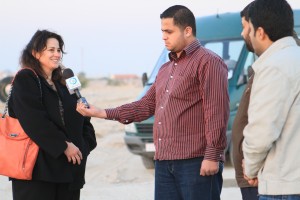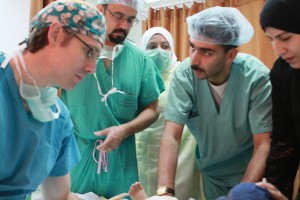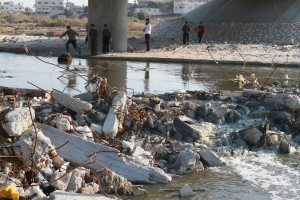Washington surgical team helping kids in Gaza every day
(This is Part 6 in a series. For the next several days, Gerri Haynes, a former president of Washington Physicians for Social Responsibility, will be sending back reports from inside blockaded Gaza. As she did twice before, Gerri has organized a team of doctors and other health care providers to work in hospitals and clinics in Gaza in an effort to directly help the people there and to bring attention to the ongoing humanitarian crisis that the Israeli blockade has created.)
Complex surgeries awaited the pediatric urology team when we arrived in Gaza. For Richard Grady, Ismael Zamilpa and Johanna Longacre, each day is filled with opportunities to help some of Gaza’s children. As they operate, the team is also teaching a group of local surgeons.
Members of our group accompanied Steve Gilbert for a tour of toxic sites in Gaza. Scientists demonstrated for us the challenges of dealing with the flow of sewage.One temporary plant for partial treatment of sewage was said to provide a variable percentage of treatment for a small fraction of the sewage in the Khan Younis area. At best, the sewage in this area is 80% clear prior to entering the sea.
When the daily break in electricity occurs, sewage flows untreated into the Mediterranean. Permission is needed from Israel to site a treatment plant in the clay soil near Gaza’s eastern border.
Access to building materials and reliable electricity are essential if permanent solutions are to be found to the crisis in sewage management. In the meantime, the soil and the sea continue to be heavily contaminated.

Laura Hart being interviewed about what we have learned about the environment in Gaza. (Bob Haynes photo)
Continuous Traumatic Stress Injury (not PTSD) is experienced by all people here, including the health care providers. When an Israeli war plane flies overhead, people feel anxious.
Threats of further attacks are noted frequently in the international press. One student mentioned that her son asks her every day if they are going to be bombed again. This student asked how she should answer her son – should she tell him not to worry or should she be more honest.
I suggested that families sit together and talk about their hopes for no more attacks, to remember the helpful things they did to deal with the last attack and then to formulate a plan in case another attack occurs.
Working together, the class described a list of items that might give their families a sense of being better prepared. Faith in God and the strength of family groups were cited as crucial to survival here.Resilience is the lesson Gaza will teach the world.
RSS feed for comments on this post. TrackBack URI

